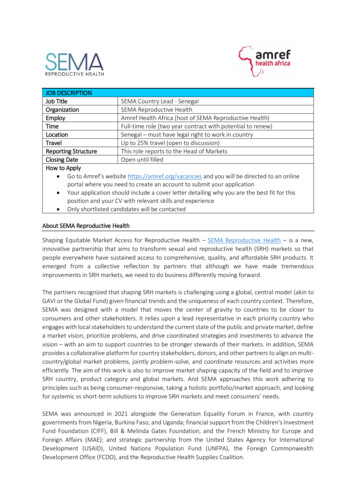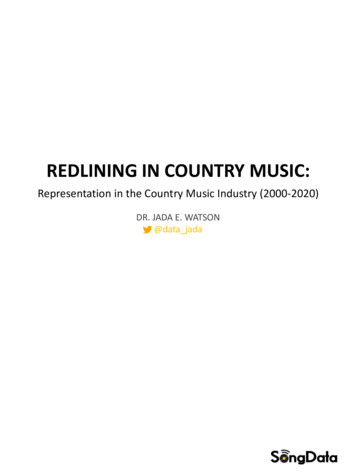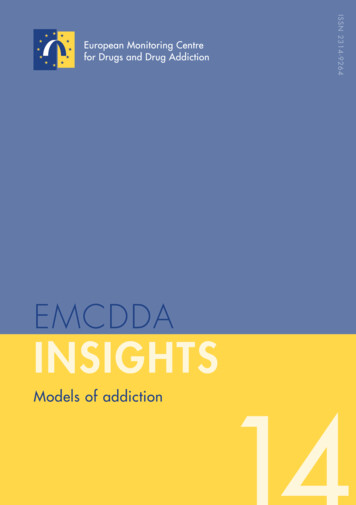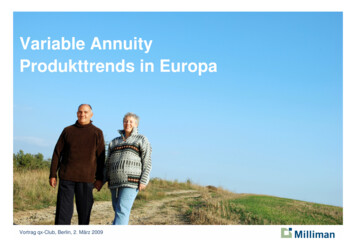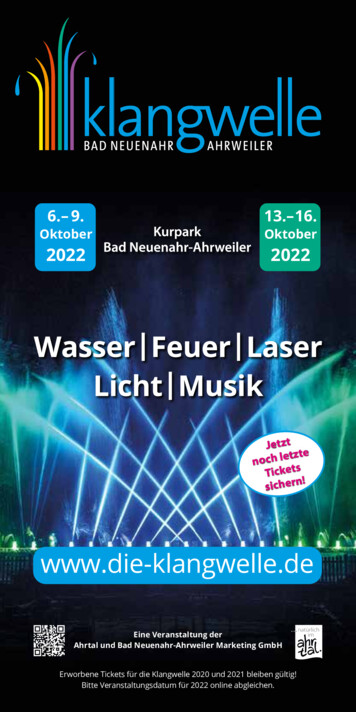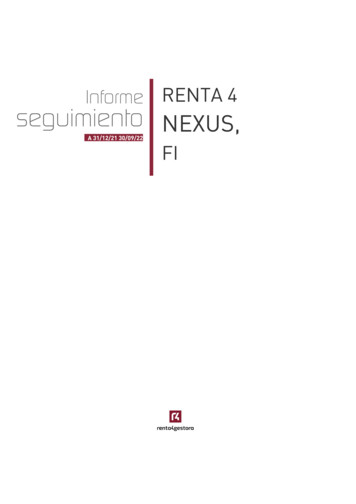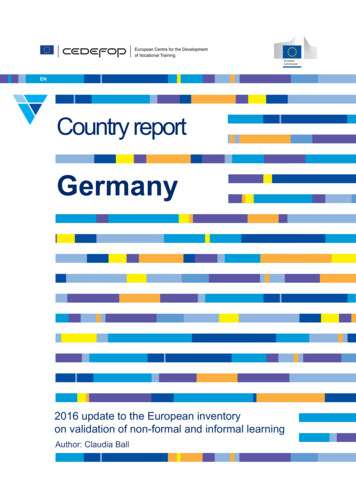
Transcription
ENCountry reportGermany2016 update to the European inventoryon validation of non-formal and informal learningAuthor: Claudia Ball
Country report: GermanyAcknowledgementsThis country update was produced by Claudia Ball, as part of the 2016 update to theEuropean inventory on validation, a project managed by ICF (lead consultants: Jo Hawley,Ilona Murphy and Manuel Souto-Otero) under the supervision of a Steering Committeeformed by Cedefop (Ernesto Villalba, Hanne Christensen, and Jens Bjornavold), theEuropean Commission (Koen Nomden, Lieve Van den Brande, Martina Ni Cheallaigh,Corinna Liersch and Anna Nikowska) and the ETF (Anna Kahlson and Eduarda CastelBranco). The report has benefitted from feedback from the European qualificationsframework advisory group (EQF AG) members for Germany as well as other national-levelquality assurance (QA) contacts with expertise in validation.Work was carried out under Cedefop's service contract No 2014- /14.Disclaimer:The contents of this publication do not necessarily reflect the position or opinion of theEuropean Commission, Cedefop, the ETF, the ICF, the EQF AG members or the other QAcontacts. Neither the European Commission nor any person/organisation acting on behalf ofthe Commission is responsible for the use which might be made of any informationcontained in this publication. The publication has neither been edited nor proof-read byCedefop’s editing service.i
Country report: Germany1Introduction and Evaluation1.1AbstractGermany’s federal structure determines shared competences of the Bund (Germanfederation) and the Länder (federal states) in education and training. The Grundgesetz(Basic Constitutional Law of the Federal Republic of Germany) stipulates that primaryresponsibility for legislation and administration in education rests with the Länder. The scopeof the Federal Government's responsibilities in the field of education is also defined in theGrundgesetz, according to which the Bund bears responsibility particularly for the regulationsgoverning the following domains of education: In-company vocational training and vocational further education Admission to higher education institutions and higher education degrees (here theLänder may enact laws at variance with the legislation of the Federation) Financial assistance for pupils and students Legal protection of participants of correspondence courses Regulations on entry to the legal profession Regulations on entry to medical and paramedical professions Employment promotion measures as well as occupational and labour market researchDue to Germany’s federal structure, a common legal framework and a standardised systemfor the validation of non-formal and informal learning at national level and across educationsectors does not exist in the country.Validation of non-formal and informal learning is taking place in all education sectors.However, all education sectors have different, but tailor-made approaches to validation inplace. Moreover, validation of non-formal and informal learning supports the transition fromone education sector to another, for example from school to VET or from VET to highereducation.Since the introduction of the Vocational Training Act in 1969, the Externenprüfung (ExternalStudents’ Examination) provides a legally based instrument for the validation of non-formaland informal learning by giving access to the regular (final) examination within the formalVET system without prior formal training. So far, the External Students’ Examination hasbeen the major instrument related to validation within vocational education and training. InHigher Education (HE), decisions of the Standing Conference of the Ministers of Educationand Cultural Affairs of the Länder in the Federal Republic of Germany (KMK) regardingcrediting qualifications acquired at work are implemented by federal state laws. Within thislegal framework, validation initiatives primarily take place at university level. There are anumber of elaborated validation instruments within the Adult Education Sector and in theThird Sector (Further and Continuing Education and ct(BQFG,Berufsqualifikationsfeststellungsgesetz) was introduced in 2012. It is meant to improve theassessment and recognition of professional and vocational education and trainingqualifications acquired abroad. This Act is currently perceived as a starting point to shiftparadigms with regards to validation. This is due to its consideration of professionalexperience as a central aspect of an individual’s competence profile and vocationalqualifications, and its openness to validation of non-certified learning, albeit only for holdersof a formal foreign qualification. This potential is currently explored at project level.1
Country report: GermanyAt national level, the topic of validation is currently discussed in different initiatives andprojects. Discussions on referencing the outcomes of non-formal and informal learning to theGerman Qualifications Framework (DQR) are still in progress.1.2Main changes since the 2014 updateFurther steps have been implemented during the past two years. Within the formal system ofeducation, which already contains elements for the validation of non-formal and informallearning, bottom-up and top-down approaches complement each other.Since 2014, two intertwined national working groups have been convened on the validationof non-formal and informal learning at national level. An expert working group on referencingresults of non-formal learning to the German Qualifications Framework (DQR) was convenedby the Federal Ministry of Education and Research (BMBF) and the Standing Conference ofthe Ministers of Education and Cultural Affairs of the Länder in the Federal Republic ofGermany (KMK). The working group provided its recommendations to the DQR workinggroup in 2014 (see Expertengruppe, 2014). The recommendations are still under discussionwithin the DQR working group. The second working group has been convened by the BMBFon the subject of “validation of non-formal and informal competences”.The Professional Qualifications Assessment Act (BQFG) is extensively monitored and thevalidation opportunity integrated into the BQFG through the so-called “Qualifikationsanalyse”(qualification analysis) has been researched and further developed in the context of twoprojects: “Prototyping” and “Prototyping Transfer”. The “Qualifikationsanalyse” is currentlytaken up in the “ValiKom” project that explores a similar approach emerging from foreignqualifications. The “ValiKom” project aims at developing a standardised procedure for thevalidation of non-formal and informal learning by taking into account the approachestablished in the frame of the BQFG. Due to its consideration of professional experience asa central aspect of an individual’s competence profile and vocational qualifications and itsopenness to validation of non-certified learning, the BQFG can be considered as a catalystfor further development of validation-specific methods, quality criteria, training for validationprofessionals, information, advice, and guidance (IAG), etc. The “ValiKom” project iscurrently exploring a potential transfer of results to a wider target group.In addition to these operational approaches, there have been a number of further initiativesand (research) projects undertaken or started on the validation of non-formal and informallearning. A research project on the implementation of methods for the validation of nonformal and informal learning was implemented by the Federal Institute for VocationalEducation and Training (BIBB) in 2015. The focus of validation efforts is therefore primarilyfocused on validation in the context of vocational education and training and on the existingformal education structures and standards.The External students’ examination as well as measures described with regard to highereducation and validation in the Third sector in the previous Inventory updates (such as in the2010 and 2014 country reports), remain in operation.Validation in Germany is widely understood as an overall process that includes all fourstages of validation, as well as one step within the validation processes in betweenassessment and certification (Annen & Bretschneider, 2014). However, in practice, theunderstanding of validation still differs across education sectors and thus leads to the needfor further discussion and confidence building in order to develop mutual understanding andtrust as a basis for next steps related to validation.Although awareness about validation opportunities among potential validation users is still ata rather low level, research suggests that awareness of and trust into the existing validationinstruments seems to be increasing; this is especially so in the context of the BQFG,targeting primarily immigrants/refugees due to its focus on foreign qualifications. There have2
Country report: Germanybeen efforts undertaken with regard to the development of validation infrastructures,including awareness raising, IAG, etc., in the context of immigration. They are stronglyrelated to the BQFG, but there are also a number of other validation instruments andinitiatives implemented by different bodies across the country and targeting the validation oflearning of immigrants/refugees2National perspective2.1Overarching approach to validationValidation of non-formal and informal learning is taking place within all education sectors inGermany with all sectors having different approaches in place. Approaches to andunderstanding of validation differ.In 2013, two working groups have been convened on the validation of non-formal andinformal learning at national level. An expert working group on referencing results of nonformal learning to the German Qualifications Framework (DQR) was convened by theFederal Ministry of Education and Research (BMBF) and the Standing Conference of theMinisters of Education and Cultural Affairs of the Länder in the Federal Republic of Germany(KMK) in April 2013. This expert working group provided its recommendations to the DQRworking group in 2014 (see Expertengruppe, 2014). The recommendations are still underdiscussion within the DQR working group.The second working group has been convened by the BMBF on “validation of non-formaland informal competences” in order to exploit expert knowledge from policy, practice,science and social partners and to promote the validation of non-formal and informal learningon a political level and in practice through a joint approach. The working group identifiedthematic areas to be addressed within future activities (BMBF, 2015a).The Coalition Agreement between the political parties CDU, CSU and SPD (CDU, CSU &SPD, 2013) specifies the development and testing of methods for the recognition of informallearning in the context of vocational education and training. This is also where initiatives withregard to validation have been focused on in the past two years (2014-2016).Overall, validation in Germany can still be described as a colourful mosaic of local, regional,sectoral and national approaches and initiatives which also reflects the allocation ofresponsibilities within the complex German educational system. Experts therefore claim thata national validation system has not yet become apparent in Germany, although it isdiscussed in the framework of the European education policy debate (Dehnbostel, 2015).The Bundesinstitut für Berufsbildung (Federal Institute for Vocational Education andTraining, BIBB) currently implements the project “Einführung von Verfahren zur Validierungnichtformalen und informellen Lernens – Anforderungen und Handlungsoptionen”(Implementation of methods for the validation of non-formal and informal learning –requirements and possible courses of action). This project intends to: a) identify qualityindicators for validation methods; b) analyse existing validation options in Germany based onthe identified indicators; c) develop scenarios for the different variations of possible validationmethods; and, d) evaluate those scenarios regarding their potential realisation. Results areto be expected by the end of 2017.In 2015, an expert monitoring has been implemented by the Bundesinstitut für Berufsbildung(BIBB) and Bertelsmann Stiftung regarding expert opinion on opportunities and limitations ofvalidation methods for the recognition of non-formal and informal learning. The monitoringstressed the need for a stronger appreciation (valuing) of non-formal and informal learning inGermany. 70 % of the experts support a nation-wide validation system. Current validationopportunities such as Externenprüfung are considered as insufficient by the experts. (Velten& Herdin, 2016)3
Country report: Germany2.2Validation in education and trainingAs discussed in the previous Country Updates, legislative provisions are in place forvalidation in the field of vocational education and training. This includes the Externalstudents’ examination under § 45 (2) of the Vocational Training Act (BBiG) and § 37 (2) ofthe Crafts Code (HwO), which is targeted at people with vocational experience andlegitimises admission to the final examination in a recognised occupation that normallyrequires formal training in the dual system. Therefore, the External students’ examinationleads to the award of a full qualification (there is no difference between this qualification anda regularly acquired qualification) in a recognised apprenticeship trade.In the context of the external examination, the “Teilqualifizierung” (partial qualification) is apotential result of the validation of non-formal and informal learning within vocationaleducation and training. 22 occupations have been itemised into “Ausbildungsbausteine”(training modules) within the project JOBSTARTER CONNECT. The approach does, amongothers, allow for acquiring such an “Ausbildungsbaustein” through a competenceassessment based on professional experience. The modules prepare together for theexternal examination within the targeted occupations (Schöpf, 2015).Similar to the External students’ examination within IVET, admission to further vocationaleducation examinations in the context of the “Industriemeister” (industrial master) and“Handwerksmeister” (master craftsman) is also possible via validation. In addition, access tothe examination can be granted by work experience only. Attendance of preparatory trainingfor this examination is not compulsory.The Professional Qualifications Assessment Act (BQFG) – being in place since 2012 – is ofmajor relevance here. It primarily serves the assurance of skilled labour as well as theintegration of migrants in Germany. All persons possessing a qualification acquired in aforeign country have a legal right to have the equivalence of this qualification verified by acompetent authority within three months based on this law. The Act applies to initial (IVET)as well as further vocational education and training (CVET). However, it does not lead to thesame certificate as the formal learning pathway, but it leads to the same rights of use (Böse,Schreiber & Lewalder, 2014). Engelmann & Müller-Wacker (2014) claim that a shift ofparadigms has been started by the Recognition Act by considering professional experienceas a central aspect of an individual’s competence profile and vocational qualifications (BQFG§3, Abs. 1). However, experiences on how this is applied in practice, are different.Interviewees state that, in most cases, professional experience showed by validationcandidates is sufficient in order to close gaps within formal education pathways. Engelmann& Müller-Wacker (2014) see a need for more coherence in the validation of non-formal andinformal learning through professional experience.This Act also entails in § 14 other procedures for the determination of equivalence when noproofs for prior learning can be provided, which opens opportunities for the validation of nonformal and informal learning. This paragraph intends to give access to equivalenceassessments for professionals who cannot provide relevant documents on their foreignformal qualifications or their further vocational education and training for reasons beyondtheir control. It also applies to those who, in addition to their formal qualification, claim tohave professional experience for which they do not have formal proof. This is therefore thefirst time concrete methods for the assessment of competences below legislative level arelegally specified. About 79 % of “Handwerkskammern” (Chamber of Crafts) confirm the highrelevance of professional experience within the recognition process. (Böse, Schreiber &Lewalder 2014). This “Qualifikationsanalyse” has been subject of the “Prototyping” project(2011-2014) that developed standards, supporting structures and tools for theimplementation of “Qualifikationsanalyse” in the framework of the BQFG. The successorproject “Prototyping Transfer” (2015-2017) aims to increase the number of quality-assuredQualification Analyses (BMBF, 2015a).4
Country report: GermanyAs of 2015, a new project “ValiKom” (11/2015-10/2018) has been started. Around two millionyoung Germans aged 20 to 34 did not complete any formal vocational training. Theyacquired relevant skills and competences through the work process but lack a certificate or acomprehensible document demonstrating what they know and are able to do. Progressionroutes and social participation is hampered on impact. Moreover, employers face a variety ofdocuments job seekers present that they cannot easily understand.As a result, the German government has stated in its coalition treaty that it seeks to developand test new processes leading to transparency and recognition for people who have nonformally and informally acquired skills. To this purpose, the Federal Ministry of Educationand Research (BMBF), together with the Association of German Chambers of Commerceand Industry (DIHK) and the German Confederation of Skilled Crafts (ZDH), agreed to askeight chambers of both sectors to conduct the pilot project "ValiKom”. The aim of the projectis to establish a framework with a view to validating occupational skills and competencesthrough standardised procedures, assessment criteria and tools.The project’s appoach refers to the prevailing training regulations and occupational profilesand, at the end of the day, issues a certificate expressing the extent to which the skillsdemonstrated are equivalent to the ones regularly gained under the vocational training act.The project addresses not only low skilled adults working in Germany but also employeeswith a diverse career and background who wish to access the system of further training. Inaddition, refugees with work experience but without formal qualifications who are regularlynot targeted by the Recognition Act (BQFG) are intended to benefit from the validationprocedure as well.Within Higher Education, the situation primarily remains the same as described in thecountry report in 2014: the decisions of the KMK which determine the framework forrecognition by universities remain in place. These relate to providing credit for competencesacquired at work (2002, extended 2008) and granting access to HE for qualified workers(2009). Validation of non-formal and informal learning within higher education has beenfurther taken up in the framework of the ANKOM-initiative described in the 2010 and 2014updates and is also part of the “Aufstieg durch Bildung: offene Hochschulen” (Advancementthrough Education: Open Universities) initiatives in the sense of permeability betweenvocational education and training and higher education. Higher education initiatives in thiscontext are implemented primarily by individual higher education institutions andpartnerships. In this context, either so-called ‘individual’ or ‘global’ procedures can beemployed, or a combination of both. Individual procedures are based on proof provided byapplicants that are compared to the contents of a degree programme. Global procedures arebased on a comparison of vocational curricula and curricula of higher education programmesto identify global equivalences that can be recognised (see Stamm-Riemer, Loroff &Hartmann, 2011). However, only degrees that result from formal further training are relevantto this. Since special work experience is a precondition for the acquisition of these degrees,the approach may also be regarded as recognition of non-formal and informal learning. Onthe other hand, initiatives aiming at the recognition of learning from higher education, in thecontext of vocational education and training, take place on project basis and are usuallylimited to a particular region.The validation of learning undertaken by means of open education resources (OERs),specifically in the context of MOOCs and Open Course Ware initiatives, is at an early stageof development and very heterogeneous. MOOCs are specifically available in the context ofhigher education, but also within adult learning. Nevertheless, the recognition of learning istreated very differently from one provider to another.The OPCO12 initiative has been implemented by a consortium involving, among others,higher education institutions. The initiative provided recognition opportunities in the contextof ECTS points for students at the Frankfurt University when combined with tutorials or5
Country report: Germanyadditional performance records. Alternatively, online badges on three levels have beenawarded based on course performance. In addition, the Kaiserslautener Open OnlineCourse (KLOOC) awards ECTS points to students at TU Kaiserslautern. Similar initiativesare carried out in other universities. The platform diversity offers a specific ECTS-Track thatinvolves a final examination and ECTS points from the university of the lecturer. It is howeverup to the learner’s university to recognise those credits.The adult education centre, MOOCs (VHS MOOC), and the “mooin” learning platform workwith a badge system for its participants. There is no data available about the level ofacceptance or recognition of such badges on the labour market or in society at large.However, validation of learning undertaken by means of OERs does so far not play a majorrole, according to studies and publications (see DIPF, 2016 and BMBF & KMK, 2015).2.3Validation and the labour marketFurther Projects and initiatives directed towards auditing individual competence profiles inorder to define a career project or plan a professional reorientation or training are often (butnot exclusively) initiated below legislative level. This includes, to a large extent, validationopportunities that have been described in the 2010 and 2014 updates such as: ProfilPASSProfilPASS identifies skills and competences gained throughout life. It is available as aneProfilPASS and a regular ProfilPASS and can be used with and without consultation ofa qualified coach. The ProfilPASS system is scientifically accompanied by the GermanInstitute for Adult Education (DIE) and the Institute for Development Planning andStructural Research (ies). “Qualipass/Qualipass – Bildungspass Baden Württemberg“ (Education passBaden Württemberg)Qualipass addresses young people and adults; the latter with a special instrument. Itdocuments a wide range of practical experiences and competences gained in differentsettings and is used together with coaches. It has a strong focus on voluntaryengagement and is overseen by Jugendstiftung Baden-Württemberg. “Qualifizierungspass” (Qualification pass)The Qualification pass is used in order to document vocational qualifications andexperiences within and outside of formal initial and continuous VET. It can be used withinpost-qualification related to the External students’ examination, as described above. It ishanded out by providers that comply with standards for post-qualification, which havebeen upon with the BIBB. It has therefore a direct link to the formal education systemand its results can be used to obtain access to the External students’ examination. AiKomPassA new approach, the AiKomPass, has been developed in the project ‘Recognition ofinformally acquired competences (AIKO)’ in Baden Württemberg. The approach focuseson results of informal learning related to work in the metal and electrical industry. Thetool is meant to support skilled workers as well as job-seekers in their careerdevelopment.In the context of collective labour agreements, a number of branches validated competencesacquired through informal learning with qualifications in the formal education system.Examples are the metal and electrical industry, as well as the building industry. However,this is not based on an actual assessment, but on the performance rating of employers withregard to individual employees’ competences. There is usually no documentation of thisclassification. (Schöpf, 2015)6
Country report: GermanyFurthermore, there are a number of approaches applied at company level; those are, amongothers, assessments, competence checks, diagnostics, personnel and work analysisapproaches or supplier certificates (Dehnbostel, 2015).2.3.1Skills auditsTo better integrate young people into training and counteract shortages of skilled staff, theBMBF, the Federal Ministry of Labour and Social Affairs (BMAS) and the FederalEmployment Agency (BA) consolidated and expanded certain funding measures in 2014.The “Educational Chains” initiative (“Abschluss und Anschluss - Bildungsketten bis zumAusbildungsabschluss”), funded by the Federal Government, BA and ESF, aims to provideup to 500 000 potential analyses for students at schools and career start coaching for up to115 000 students at around 2 550 schools between 2015 and 2018. These activities will besupplemented by careers orientation measures, career entry support activities and specialtraining support measures. The whole of the process from vocational orientation to the startof training is documented by using a central organisational and support instrument such asthe career choice pass (Berufswahlpass). The aim is to introduce this into all schools andforms of schools on a gradual basis. Since July 2014, the National AssociationBerufswahlpass is coordinated by the “Servicestelle Bildungskette” at the BIBB. Currently theFederal and Länder governments are negotiating the sustainable anchoring of theEducational Chains approach in the regular Länder education and training system inFederal-Länder agreements.Under the jurisdiction of the social code (SGB II and SGB III), the Vocational and CareerPsychology Service (BPW) of the German National Employment Agency has developedservices for competence assessment. They are intended to “better identify soft skills oftheir [the employment agencies] customers and use the results for job search and targetedintegration measures” (IAG, 2014, p.6). In addition, this profiling of the German employmentservice can be seen as a kind of skills audit. This profiling includes competences acquiredthrough non-formal or informal learning. It is based on a multistage process in order toidentify different competence dimensions (IAB, 2014):2.4 K1 – Questionnaire for the self-assessment of performance within professional life; K2 – Test to assess perception; K3 – Assessment of performance orientation; and, K4 – Assessment centre to assess social and communication skills. The results of thisassessment are used internally within job-search assistance. A certification for externaluse, such as for job application, is not yet foreseen (Schöpf, 2015).Validation and the third sectorA number of different certificates and validation opportunities exist in the third sector, in orderto document voluntary engagement. Major certificates in this field are: “Kompetenznachweis Kultur” (Certificate of Competence Culture)The “Certificate of Competence Culture” is usually awarded to young people up to theage of 27 and covers different areas of competence development outside of formaleducation settings. It is mostly used to document competences acquired in the context ofartistic and cultural youth work, such as activities in art or music schools, theatre anddance workshops, media centres or museums. The competence certificate follows aportfolio approach and is implemented in four steps: (1) a praxis analysis that identifiesthe potential competences that can be acquired within a relevant programme; (2) anobservation of the young person’s performance by a qualified coach; (3) a dialoguebetween the coach and the young person on the observation results in order to start a7
Country report: Germanyself-reflection process; and, (4) a documentation of competences in the competencepass. “Nachweis International” (Certificate International)“Nachweise International” documents the participation (Certificate of ParticipationInternational), the engagement (Certificate of Engagement International) and thecompetences (Certificate of Competence International) acquired in international youthwork projects. The Certificate of Participation International contains a short description ofthe sponsor, a brief explanation of the work field of international youth work, as well as acharacterisation of the project and its educational goals. The Certificate of EngagementInternational contains all information on the Certificate of participation. In addition,engagement demonstrated individually by the young person, as well as their activecontributions, are described. The Certificate of Competence International gives testimonyin detailed form to individually demonstrated competences, which have been worked outin an especially developed procedure of certification. It can only be issued by certifiedKNI-coaches and consists of the four steps competence-based analysis of a project,surveillance, dialogue and text of evidence. Target groups are the participants ofinternational youth work projects.The Certif
learning, bottom-up and top-down approaches complement each other. Since 2014 two, intertwined national working groups have been convened on the validation of non-formal and informal learning at national level. An expert working group on referencing results of non-formal learning to the German Qualifications Framework (DQR) was convened

